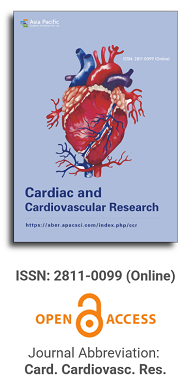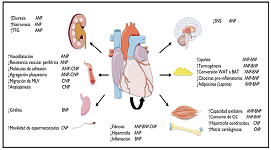
Asia Pacific Academy of Science Pte. Ltd. (APACSCI) specializes in international journal publishing. APACSCI adopts the open access publishing model and provides an important communication bridge for academic groups whose interest fields include engineering, technology, medicine, computer, mathematics, agriculture and forestry, and environment.

Omega-3 fatty acids have little or no cardiovascular protection: An interventional study
Vol 3, Issue 2, 2022
Download PDF
Abstract
Background: There is a great deal of public belief in the cardiovascular benefits of omega-3 fats. Recent trials on the effects of omega-3 fatty acids in cardiovascular issues are unclear or have failed to demonstrate significant benefits in reducing cardiovascular events. The current study aims to perform a human trial using omega-3 fatty acids as a supplementation to test its effectiveness on cardiovascular diseases. Methods: A randomized interventional study was carried out in 145 patients in the age group of 18 or older at any risk of cardiovascular disease. A treatment period of 6 months with supplementation of daily dose of 360 mg of EPA and 480 mg of DHA for one group and to the other group, atorvastatin 10 mg were given. Biochemical and clinical evaluations were performed for the baseline, 3rd and the 6th months to assess the effectiveness of omega-3 fatty acids on cardiovascular diseases. Results: The changes in the biochemical parameters total cholesterol, High density lipoprotein (HDL), Low density lipoprotein (LDL), and triglycerides among the omega-3 fatty acid group and statin group were as 218.17 vs 204.45, 55.24 vs 60.3, 142.9 vs 132.41and 168.95 vs 152.5, respectively with a p value of 0.0001. Omega-3 supplements were shown to have little to no effect on the risk of cardiovascular diseases according to the research. Conclusion: The better evidence identified in this research does not demonstrate any cardiovascular protection with the supplementation of omega-3 fats.
Keywords
References
- World Health Organization [Internet]. Cardiovas-cular Diseases (CVDs). Fact sheets; 2017 [cited 2017 Nov 24]. Available from: www.who.int/me diacen-tre/factsheets/fs317/en.
- Li D, Sinclair A, Wilson A, et al. Effect of dietary alpha-linolenic acid on thrombotic risk factors in vegetarian men. Clinical Nutrition 1999; 69: 872–882.
- Pawlosky RJ, Hibbeln JR, Novotny JA, et al. Phys-iological compartmental analysis of alpha-linolenic acid metabolism in adult humans. Journal of Lipid Research 2001; 42: 1257–1265.
- Bhatnagar D, Durrington PN. Omega-3 fatty acids: Their role in the prevention and treatment of ather-osclerosis related risk factors and complications. International Journal Clinical Practice 2003; 57: 305–314.
- British Nutrition Foundation. n-3 fatty acids and health. London: British Nutrition Foundation; 1999.
- Calabresi L, Villa B, Canavesi M, et al. An omega-3 polyunsaturated fatty acid concentrate increases plasma high-density lipoprotein 2 cholesterol and paraoxonase levels in patients with familial com-bined hyperlipidemia. Metabolism 2004; 53:153–158.
- Chang CL, Deckelbaum RJ. Omega-3 fatty acids: Mechanisms underlying “protective effects” in atherosclerosis. Current Opinion in Lipidology 2013; 24: 345–350.
- Geelen A, Brouwer IA, Zock PL, et al. Antiarrhyth-mic effects of n-3 fatty acids: evidence from human studies. Current Opinion Lipidology 2004; 15: 25–30.
- Papanikolaou Y, Brooks J, Reider C, et al. U.S. adults are not meeting recommended levels for fish and omega-3 fatty acid intake: Results of an analysis using observational data from Nhanes 2003-2008. Nutrition Journal 2014; 13: 31.
- Nice [Internet]. Cardiovascular disease: Risk as-sessment and reduction, including lipid modifica-tion Clinical guideline. 2014 [updated 2016 Sept.]. Available from: www.nice.org.uk/guidance/cg181.
- Ballard-Barbash R, Callaway CW. Marine fish oils: Role in prevention of coronary artery disease. Mayo Clinic Proceedings 1987; 62: 113–118.
- Burr ML. Fish and ischemic heart disease. World Review of Nutrition Diet 1993; 72: 49–60.
- Kris-Etherton PM, Harris WS, Appel LJ. Fish con-sumption, fish oil, omega-3 fatty acids, and cardi-ovascular disease. Circulation 2002; 106(27): 47–57.
- Campbell A, Price J, Hiatt WR. Omega-3 fatty acids for intermittent claudication. Cochrane Database of Systematic Reviews 2013; 7.
- He Z, Yang L, Tian J, et al. Efficacy and safety of omega-3 fatty acids for the prevention of atrial fi-brillation: A meta-analysis. Canadian Journal of Cardiology 2013; 29: 196–203.
- Zhao Y, Chen Q, Sun Y, et al. Prevention of sudden cardiac death with omega-3 fatty acids in patients with coronary heart disease: A meta-analysis of randomized controlled trials. Annals of Medicine 2009; 41: 301–310.
- Trikalinos TA, Moorthy D, Chung M, et al. Con-cordance of randomized and nonrandomized studies was unrelated to translational patterns of two nu-trient-disease associations. Journal Clinical Epide-miology 2012; 65: 16–29.
- Sethi A, Bajaj A, Khosla S, et al. Statin use mitigate the benefit of omega-3 fatty acids supplementation: A meta-regression of randomized trials. American Journal of Therapeutics 2016; 23: 737–748.
- Larsson SC, Orsini N, Wolk A. Long-chain omega-3 polyunsaturated fatty acids and risk of stroke: A metaanalysis. European Journal of Epidemiology 2012; 27: 895–901.
- Balk EM, Adam GP, Langberg V, et al. Omega-3 fatty acids and cardiovascular disease: An updated sys-tematic review [Internet]. Rockville (MD): Agency for Healthcare Research and Quality; 2016. Availa-ble from: www.effectivehealthcare.ahrq.gov/ re-ports/final.cfm.
- Kromhout D, Giltay EJ, Geleijnse JM. n-3 fatty acids and cardiovascular events after myocardial infarc-tion. The New England Journal of Medicine 2010; 363: 2015–2026.
- Harris WS, Zotor FB. n-3 fatty acids and risk for fatal coronary disease. Proceedings of Nutrition Society 2018; 1–6.
- Hoogeveen EK, Geleijnse JM, Kromhout D, et al. No effect of n-3 fatty acids on high-sensitivity C-reactive protein after myocardial infarction: The Alpha Omega Trial. European Journal Preventive Cardiology 2014; 21: 1429–1436.
- Casula M, Soranna D, Catapano AL, et al. Long-term effect of high dose omega-3 fatty acid supplemen-tation for secondary prevention of cardiovascular outcomes: A meta-analysis of randomized, double blind, placebo-controlled trials. Atherosclerosis Supplements 2013; 14: 243–251.
- Geleijnse JM, Giltay EJ, Schouten EG, et al. Effect of low doses of n-3 fatty acids on cardiovascular dis-eases in 4,837 post-myocardial infarction patients: Design and baseline characteristics of the Alpha Omega Trial. American Heart Journal 2010; 159: 539–546.
- Nosaka K, Miyoshi T, Iwamoto M, et al. Early initi-ation of eicosapentaenoic acid and statin treatment is associated with better clinical outcomes than statin alone in patients with acute coronary syn-dromes: One-year outcomes of a randomized con-trolled study. International Journal of Cardiology 2017; 228:173–179.
- Abdelhamid AS, Brown TJ, Brainard JS, et al. Omega-3 fatty acids for the primary and secondary prevention of cardiovascular disease. Cochrane Database System Review 2018; 1: 730.
- Janie A, Cecile V, William SH, et al. Compare the serum triglyceride response to high-dose supple-mentation with either DHA or EPA among individ-uals with increased cardiovascular risk: The com-pared study. British Journal of Nutrition 2019: 1–32.
- Nigam A, Talajic M, Roy D, et al. Fish oil for the reduction of atrial fibrillation recurrence, inflam-mation, and oxidative stress. JACC 2014; 64: 1441–1448.
- Abeywardena MY, Patten GS. Role of 3 longchain polyunsaturated fatty acids in reducing cardio- metabolic risk factors. Endocrine Metabolic & Im-mune Disorders 2011; 11: 232–246.
- Anagnostis P, Vaitsi K, Veneti S, et al. Maturitas management of dyslipidaemias in the elderly pop-ulation—A narrative review. Maturitas 2019; 0378: 1–7.
- Abdelhamid AS, Brown TJ, Brainard JS, et al. Omega-3 fatty acids for the primary and secondary prevention of cardiovascular disease. Cochrane Database System Review 2018; 18: 7.
Supporting Agencies
Copyright (c) 2022 Ramaiyan Velmurugan, D. S. Harshini Yaamika

This work is licensed under a Creative Commons Attribution 4.0 International License.

This site is licensed under a Creative Commons Attribution 4.0 International License (CC BY 4.0).

Prof. Prakash Deedwania
University of California,
San Francisco, United States




